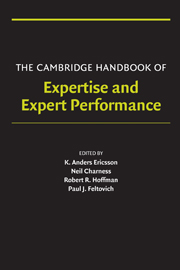Book contents
- Frontmatter
- Contents
- Acknowledgments
- Contributors
- PART I INTRODUCTION AND PERSPECTIVE
- PART II OVERVIEW OF APPROACHES TO THE STUDY OF EXPERTISE – BRIEF HISTORICAL ACCOUNTS OF THEORIES AND METHODS
- PART III METHODS FOR STUDYING THE STRUCTURE OF EXPERTISE
- PART IV METHODS FOR STUDYING THE ACQUISITION AND MAINTENANCE OF EXPERTISE
- PART V DOMAINS OF EXPERTISE
- PART VI GENERALIZABLE MECHANISMS MEDIATING EXPERTISE AND GENERAL ISSUES
- 34 A Merging Theory of Expertise and Intelligence
- 35 Tacit Knowledge, Practical Intelligence, and Expertise
- 36 Expertise and Situation Awareness
- 37 Brain Changes in the Development of Expertise: Neuroanatomical and Neurophysiological Evidence about Skill-Based Adaptations
- 38 The Influence of Experience and Deliberate Practice on the Development of Superior Expert Performance
- 39 Development and Adaptation of Expertise: The Role of Self-Regulatory Processes and Beliefs
- 40 Aging and Expertise
- 41 Social and Sociological Factors in the Development of Expertise
- 42 Modes of Expertise in Creative Thinking: Evidence from Case Studies
- Author Index
- Subject Index
- References
40 - Aging and Expertise
from PART VI - GENERALIZABLE MECHANISMS MEDIATING EXPERTISE AND GENERAL ISSUES
- Frontmatter
- Contents
- Acknowledgments
- Contributors
- PART I INTRODUCTION AND PERSPECTIVE
- PART II OVERVIEW OF APPROACHES TO THE STUDY OF EXPERTISE – BRIEF HISTORICAL ACCOUNTS OF THEORIES AND METHODS
- PART III METHODS FOR STUDYING THE STRUCTURE OF EXPERTISE
- PART IV METHODS FOR STUDYING THE ACQUISITION AND MAINTENANCE OF EXPERTISE
- PART V DOMAINS OF EXPERTISE
- PART VI GENERALIZABLE MECHANISMS MEDIATING EXPERTISE AND GENERAL ISSUES
- 34 A Merging Theory of Expertise and Intelligence
- 35 Tacit Knowledge, Practical Intelligence, and Expertise
- 36 Expertise and Situation Awareness
- 37 Brain Changes in the Development of Expertise: Neuroanatomical and Neurophysiological Evidence about Skill-Based Adaptations
- 38 The Influence of Experience and Deliberate Practice on the Development of Superior Expert Performance
- 39 Development and Adaptation of Expertise: The Role of Self-Regulatory Processes and Beliefs
- 40 Aging and Expertise
- 41 Social and Sociological Factors in the Development of Expertise
- 42 Modes of Expertise in Creative Thinking: Evidence from Case Studies
- Author Index
- Subject Index
- References
Summary
Introduction
Outstanding accomplishments by older individuals, such as the wisdom of elderly statesmen, the virtuoso performances of older musicians, or the swan-song oeuvres of famous composers have been the subject of admiration throughout human history. Commonsense or folk psychology rarely considers such achievements as incompatible with older age. On the contrary, in the public's opinion advanced age has been identified with maturity or heightened levels of experience that complement the exceptional talents or gifts that had presumably enabled outstanding individuals to surpass ordinary people in the first place. Allegedly, these dispositions are the driving force leading to high achievements, and the presumed stability of related capacities is believed to guarantee that outstanding individuals' superior skills remain at their disposition throughout adulthood. In traditionalist cultures (as in Germany or Japan) such appreciations of early achievement and seniority overshadow actual accomplishments and remain an integral part of society and job promotion until this day.
The scientific study of interindividual differences and the experimental investigation of human performance in normal adults portray a less optimistic picture of adult development, at least in the normal population. Ubiquitous findings of negative age-graded changes in psychometric ability factors and reduced speed or accuracy in most cognitive-motor tasks have motivated theories of broad decline, like the notion of general, age-related slowing (Salthouse, 1985a). In the light of these findings, the accomplishments by older experts and the high performance levels in many older professionals present a puzzle.
- Type
- Chapter
- Information
- The Cambridge Handbook of Expertise and Expert Performance , pp. 723 - 742Publisher: Cambridge University PressPrint publication year: 2006
References
- 32
- Cited by

